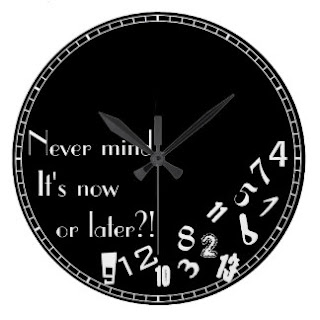“I stashed all the clocks in the attic today,” said mom’s caregiver, who fills in when I’m gone. “Time is really stressing her out.”
Clocks and calendars are a cacophony of confusion for mom. Adrift on the time-space continuum, she’s never certain of the day of the week, the season, whether morning or night. “I’m having trouble understanding August,” she confessed and pointed to the calendar, now as perplexing as her windup clock.
Not being able to keep track of time makes her anxiously ask what time it is. Yet as soon as I answer, she’s forgotten the whole conversation and asks again.
At first, I didn’t get it. But I learned that as a result of lost brain functions, people with dementia can’t judge the passage of time. Since mom can’t remember what she’s done in the immediate past, she has no way to gauge how much time has passed.
When I finally accepted this, I received an unexpected gift: compassion.
The clocks may be hidden, but their numbers remain forever jumbled in her mind.


